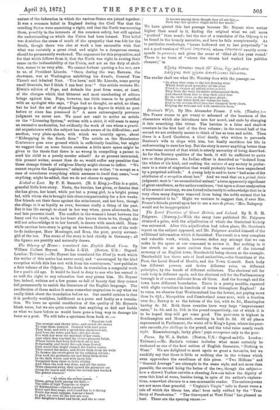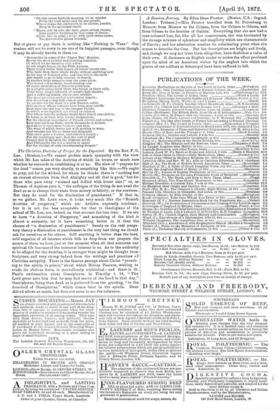reckoned as one of the best satires of English literature,
"Nothing to Wear." We are delighted to meet again so great a favourite, but we candidly say that there is little or nothing else in the volume which even approaches the excellence of this piece. " Two Millions " and
" General Average " are attempts in the same style, and not more than passable, the second being the better of the two, though the subject—
how a shrewd Yankee outwits a cheating Jew—is below the dignity of even this kind of verse, besides being, in spite of the author's explana- tions, somewhat obscure to a non-mercantile reader. The serious poems are not more than graceful. " Virginia's Virgin " tells in fluent verse a tale off which the bloom has, alas ! been sadly rubbed by the "True Story of Pocahontas." "The Graveyard at West Point" has pleased us best. These are the opening stases:—
"On this sweet Sabbath morning, let us wander From the loud music and the gay parade, Where sleeps the graveyard, in its silence, yonder, Deep in the mountain shade.
"There, side by side, the dark, green cedars cluster, Like sentries watching by that camp of Death ; There, like an army's tents, with snow-white lustre, The gravestones gleam beneath."
But of grave or gay there is nothing like "Nothing to Wear." Our readers will not be sorry to see one of its happiest passages, even though it may be already known to them :—
" Researches in some of the 'Upper Ten' districts
Reveal the moat painful and startling statistics.
Of which let me mention only a few: In one single house, on the Fifth Avenue, Three young ladies were found, all below twenty-two, Who have been three whole weeks without anything new In the way of flounced silks, and thus left in the lurch Are unable to go to ball, concert, or church.
In another large mansion near the same place, Was found a deplorable, heart-rending case Of entire destitution of Brussels point-lace. In a neighbouring block there was found, in three calls, Total want, long continued, of camel's-hair shawls; And a suffering family, whose case exhibits The most pressing need of real ermine tippets ;
One deserving young lady almost unable
To survive for the want of a new Russian sable; Still another, whose tortures have been most terrific Ever since the sad loss of the steamer Pacific, In which were ingulfed, not friend or relation (For whose fate she perhaps might have found consolation, Or borne it, at least, with serene resignation), But the choicest assortment of French sleeves and collars Ever sent out from Paris, worth thousands of dollars,
And all as to style most recherchj and rare,
The want of which leaves her with nothing to wear, And renders her life so drear and dyspeptic That she's quite a recluse, and almost a sceptic ; For she touchingly says, that this sort of grief Cannot find in Religion the slightest relief, And Philosophy has not a maxim to spare For the victims of such overwhelming despair."



































 Previous page
Previous page